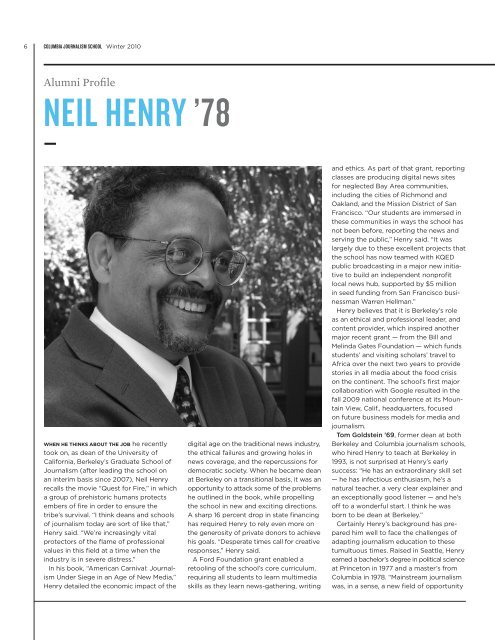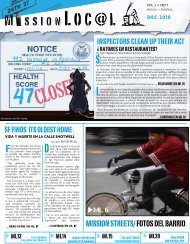Columbia Journalism sChool Winter 2010 - Berkeley Graduate ...
Columbia Journalism sChool Winter 2010 - Berkeley Graduate ...
Columbia Journalism sChool Winter 2010 - Berkeley Graduate ...
Create successful ePaper yourself
Turn your PDF publications into a flip-book with our unique Google optimized e-Paper software.
6<br />
<strong>Columbia</strong> <strong>Journalism</strong> <strong>sChool</strong> <strong>Winter</strong> <strong>2010</strong><br />
Alumni Profile<br />
neil henry ’78<br />
—<br />
When he ThinkS aBouT The JoB he recently<br />
took on, as dean of the University of<br />
California, <strong>Berkeley</strong>’s <strong>Graduate</strong> School of<br />
<strong>Journalism</strong> (after leading the school on<br />
an interim basis since 2007), Neil Henry<br />
recalls the movie “Quest for Fire,” in which<br />
a group of prehistoric humans protects<br />
embers of fire in order to ensure the<br />
tribe’s survival. “I think deans and schools<br />
of journalism today are sort of like that,”<br />
Henry said. “We’re increasingly vital<br />
protectors of the flame of professional<br />
values in this field at a time when the<br />
industry is in severe distress.”<br />
In his book, “American Carnival: <strong>Journalism</strong><br />
Under Siege in an Age of New Media,”<br />
Henry detailed the economic impact of the<br />
digital age on the traditional news industry,<br />
the ethical failures and growing holes in<br />
news coverage, and the repercussions for<br />
democratic society. When he became dean<br />
at <strong>Berkeley</strong> on a transitional basis, it was an<br />
opportunity to attack some of the problems<br />
he outlined in the book, while propelling<br />
the school in new and exciting directions.<br />
A sharp 16 percent drop in state financing<br />
has required Henry to rely even more on<br />
the generosity of private donors to achieve<br />
his goals. “Desperate times call for creative<br />
responses,” Henry said.<br />
A Ford Foundation grant enabled a<br />
retooling of the school’s core curriculum,<br />
requiring all students to learn multimedia<br />
skills as they learn news-gathering, writing<br />
and ethics. As part of that grant, reporting<br />
classes are producing digital news sites<br />
for neglected Bay Area communities,<br />
including the cities of Richmond and<br />
Oakland, and the Mission District of San<br />
Francisco. “Our students are immersed in<br />
these communities in ways the school has<br />
not been before, reporting the news and<br />
serving the public,” Henry said. “It was<br />
largely due to these excellent projects that<br />
the school has now teamed with KQED<br />
public broadcasting in a major new initiative<br />
to build an independent nonprofit<br />
local news hub, supported by $5 million<br />
in seed funding from San Francisco businessman<br />
Warren Hellman.”<br />
Henry believes that it is <strong>Berkeley</strong>’s role<br />
as an ethical and professional leader, and<br />
content provider, which inspired another<br />
major recent grant — from the Bill and<br />
Melinda Gates Foundation — which funds<br />
students’ and visiting scholars’ travel to<br />
Africa over the next two years to provide<br />
stories in all media about the food crisis<br />
on the continent. The school’s first major<br />
collaboration with Google resulted in the<br />
fall 2009 national conference at its Mountain<br />
View, Calif., headquarters, focused<br />
on future business models for media and<br />
journalism.<br />
Tom Goldstein ’69, former dean at both<br />
<strong>Berkeley</strong> and <strong>Columbia</strong> journalism schools,<br />
who hired Henry to teach at <strong>Berkeley</strong> in<br />
1993, is not surprised at Henry’s early<br />
success: “He has an extraordinary skill set<br />
— he has infectious enthusiasm, he’s a<br />
natural teacher, a very clear explainer and<br />
an exceptionally good listener — and he’s<br />
off to a wonderful start. I think he was<br />
born to be dean at <strong>Berkeley</strong>.”<br />
Certainly Henry’s background has prepared<br />
him well to face the challenges of<br />
adapting journalism education to these<br />
tumultuous times. Raised in Seattle, Henry<br />
earned a bachelor’s degree in political science<br />
at Princeton in 1977 and a master’s from<br />
<strong>Columbia</strong> in 1978. “Mainstream journalism<br />
was, in a sense, a new field of opportunity



